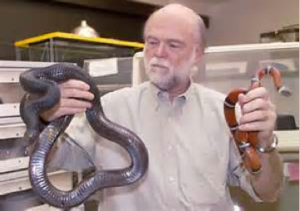Dr. Harry Greene, Professor of Ecology and Evolutionary Biology, and Faculty Curator of Amphibians and Reptiles in the Museum of Vertebrates at Cornell University, is presenting a talk titled, “Natural history, aesthetics, and conservation” on Friday, April 12.
Dr. Greene received his B.A. from Texas Wesleyan College in 1968, then served three years as an army medic. He earned his M.A. from University of Texas at Arlington in 1973 and Ph.D. from the University of Tennessee, Knoxville, in 1977. For two decades he was a professor and curator of herpetology in the Museum of Vertebrate Zoology, University of California, Berkeley, then moved to Cornell in 1999. Dr. Greene has taught natural history of the vertebrates, herpetology, introductory biology, evolution and biodiversity, desert ecology, and graduate field ecology; his research has focused on snakes and other predators in the Americas, Africa, and Eurasia, with emphasis on evolution, ecology, and conservation. His honors include the Berkeley Distinguished Teaching Award, American Society of Naturalists’ Edward Osborne Wilson Award, elected fellow of the American Association for the Advancement of Science and California Academy of Sciences,  president of the American Society of Ichthyologists and Herpetologists, and Cornell’s Stephen H. Weiss Presidential Fellowship. Dr. Greene’s Snakes: the Evolution of Mystery in Nature, won a PEN Literary Award and made the New York Times’ list of 100 Most Notable Books. His next book, Tracks and Shadows: Field Biology as Art, will be published later in 2013.
president of the American Society of Ichthyologists and Herpetologists, and Cornell’s Stephen H. Weiss Presidential Fellowship. Dr. Greene’s Snakes: the Evolution of Mystery in Nature, won a PEN Literary Award and made the New York Times’ list of 100 Most Notable Books. His next book, Tracks and Shadows: Field Biology as Art, will be published later in 2013.

